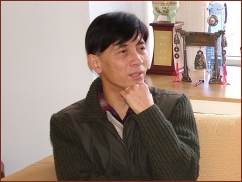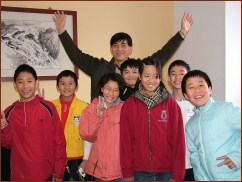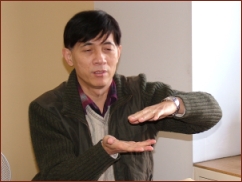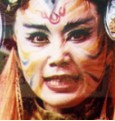|
|
 |
 Heading for the Department of Cultural Affairs,
Taipei Municipal Government to Interview Commissioner Liao Hsien-hao
Heading for the Department of Cultural Affairs,
Taipei Municipal Government to Interview Commissioner Liao Hsien-hao |
 On Jan. 17th,
2005, Mr. Lee and Ms. Huang led us to meet Commissioner Liao
Hsien-hao. The Department of Cultural Affairs once invited
the Ming Hwa Yuan to perform in Taipei Arts Festival; therefore
we’d like to know why Commissioner Liao arranged this program
for Taipei Arts Festival. Commissioner Liao said that the
cultural spirits of Taipei includes diversity, innovation,
optimism, comprehension, moderation, and vitality. Therefore,
in order to interact benignly with Taipei citizens, anything
related to cultures and arts, Department of Cultural Affairs
would take every crucial factor into careful consideration,
including the city, the culture, and the industry. The goal
of Taipei Arts Festival is mainly to urge the conversation
between the trendy and the traditional customs and festivals.
As for the arrangement of programs, dramatic troupes could
volunteer to sign up or be recommended by the academia to
collectively construct the cultural works of Taipei Arts Festival.
On Jan. 17th,
2005, Mr. Lee and Ms. Huang led us to meet Commissioner Liao
Hsien-hao. The Department of Cultural Affairs once invited
the Ming Hwa Yuan to perform in Taipei Arts Festival; therefore
we’d like to know why Commissioner Liao arranged this program
for Taipei Arts Festival. Commissioner Liao said that the
cultural spirits of Taipei includes diversity, innovation,
optimism, comprehension, moderation, and vitality. Therefore,
in order to interact benignly with Taipei citizens, anything
related to cultures and arts, Department of Cultural Affairs
would take every crucial factor into careful consideration,
including the city, the culture, and the industry. The goal
of Taipei Arts Festival is mainly to urge the conversation
between the trendy and the traditional customs and festivals.
As for the arrangement of programs, dramatic troupes could
volunteer to sign up or be recommended by the academia to
collectively construct the cultural works of Taipei Arts Festival.
|
 The Ming Hwa Yuan is the Elite of Traditional
Culture Circle
The Ming Hwa Yuan is the Elite of Traditional
Culture Circle |
|  Commissioner Liao watched the large drama Ji
Gung Huo Fo(Living Buddha, The Lord Ji)presented by the Ming
Hwa Yuan for the first time after he returned from his study
overseas. He was deeply impressed. Mr. Chen Ming-ji’s sons
have been imperceptibly influenced by what they constantly
see and hear since their childhood and successively reveal
their talents for Taiwanese Opera, either on stage or behind
the scenes. Thanks to the affiliation of the second and third
generations, they bring vigor and infinite potential to their
own family for further development. The troupe gradually eliminates
the monotonous form of traditional Taiwanese Opera to make
their dramas so down-to-earth that every Taiwanese could easily
relate to, as well as the mystic sense of mythology, combining
the tempo of modern theater, experimental theater, and scene-by-scene
technique from movies. This unprecedented revolution that
the Ming Hwa Yuan brought to Taiwanese Opera arouses great
interests among the dramatic circles and is acclaimed and
valued by the cultural and artistic circles. With the recommendation
from the Council for Cultural Affairs and the Educational
Hall of Taiwan Provincial Government, the Ming Hwa Yuan was
invited to perform in many prestigious theaters. After struggling
for more than half a century, the Ming Hwa Yuan finally was
able to make Taiwanese Opera return to the “Indoor Stage”
from the “Outdoor Stage”.
Commissioner Liao watched the large drama Ji
Gung Huo Fo(Living Buddha, The Lord Ji)presented by the Ming
Hwa Yuan for the first time after he returned from his study
overseas. He was deeply impressed. Mr. Chen Ming-ji’s sons
have been imperceptibly influenced by what they constantly
see and hear since their childhood and successively reveal
their talents for Taiwanese Opera, either on stage or behind
the scenes. Thanks to the affiliation of the second and third
generations, they bring vigor and infinite potential to their
own family for further development. The troupe gradually eliminates
the monotonous form of traditional Taiwanese Opera to make
their dramas so down-to-earth that every Taiwanese could easily
relate to, as well as the mystic sense of mythology, combining
the tempo of modern theater, experimental theater, and scene-by-scene
technique from movies. This unprecedented revolution that
the Ming Hwa Yuan brought to Taiwanese Opera arouses great
interests among the dramatic circles and is acclaimed and
valued by the cultural and artistic circles. With the recommendation
from the Council for Cultural Affairs and the Educational
Hall of Taiwan Provincial Government, the Ming Hwa Yuan was
invited to perform in many prestigious theaters. After struggling
for more than half a century, the Ming Hwa Yuan finally was
able to make Taiwanese Opera return to the “Indoor Stage”
from the “Outdoor Stage”.
Ming Hwa Yuan has given performances in the Taipei Arts Festival,
Traditional Arts Festival, Taiwan’s Spring & Autumn Arts
Festival, Kaohsiung Arts Festival, National Culture and Arts
Festival, and the Arts Festival of Asian Games. It’s no exaggeration
to regard the Ming Hwa Yuan as the elite of Taiwan’s traditional
culture.
|
 Forge Utopia for the Culture and Arts in
Taipei City
Forge Utopia for the Culture and Arts in
Taipei City |
 The teachers and parents at presence
admitted that Taipei now possesses much stronger cultural
atmosphere far more than it used to. Indeed, Taipei City,
an international metropolis with economic prosperity and scenic
Arcadia, provides citizens of Taipei with its beauty and variety
through cultural activities. These activities are mainly folk
events and cultural arts exhibitions. Through participating
in these activities, Commissioner Liao hopes that Taipei citizens
can know more about the versatility of Taipei’s culture and
experience the most energetic phase of Taipei.
The teachers and parents at presence
admitted that Taipei now possesses much stronger cultural
atmosphere far more than it used to. Indeed, Taipei City,
an international metropolis with economic prosperity and scenic
Arcadia, provides citizens of Taipei with its beauty and variety
through cultural activities. These activities are mainly folk
events and cultural arts exhibitions. Through participating
in these activities, Commissioner Liao hopes that Taipei citizens
can know more about the versatility of Taipei’s culture and
experience the most energetic phase of Taipei.
Since 1988, grand performances of traditional arts are held
in every spring in the Taipei Traditional Arts Festival. The
festival presents communal concerts, and the four major categories
of traditional arts: singing, music, dance, and dramas. These
performances have been one of the important indexes of arts
activities in Taipei City. These events may pander to both
refined and popular tastes, and fully display the quality
of Taipei citizens’ spiritual lives.
In the end, Commissioner Liao and we hope that Taipei City
can be forged into a Utopia of culture and arts through our
collective efforts on traditional arts.
|
|



